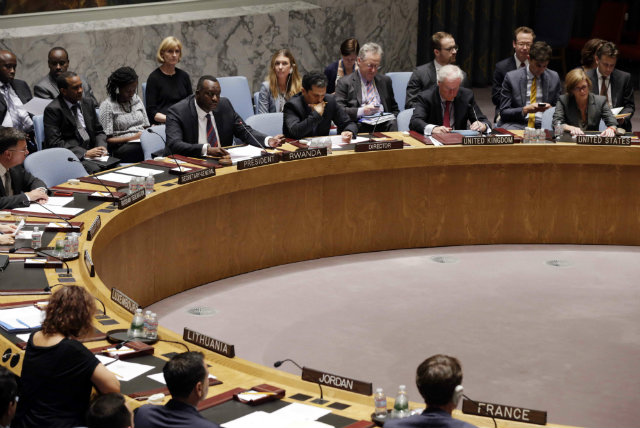SUMMARY
This is AI generated summarization, which may have errors. For context, always refer to the full article.

UNITED NATIONS (UPDATED) – The UN Security Council unanimously adopted a resolution Friday, August 15, aimed at weakening Islamists in Iraq and Syria with measures to choke off funding and the flow of foreign fighters.
It represents the most wide-ranging response yet by the top United Nations body to the jihadists who now control large swaths of territory in both countries and have been accused of atrocities.
The British-drafted measure also placed 6 Islamist leaders – from Kuwait, Saudi Arabia and other nations – on the Al-Qaeda sanctions list, which provides for a travel ban and assets freeze.
The 6 include senior Al-Qaeda leaders who have provided financing to the Al-Nusra Front in Syria and Abu Mohammad al-Adnani, the spokesman for the Islamic State (IS), formerly known as ISIS or the Islamic State in Syria and Iraq.
British Ambassador Mark Lyall Grant noted that the 15-member council had shown “strong unity” in adopting the resolution to address the ISIS and Al-Nusra threat.
“We have watched with horror their brutal actions – attempts to wipe out entire communities on the basis of their religion or belief, indiscriminate killing, illegal and savage executions, deliberate targeting of civilians and appalling levels of sexual violence, especially against women and children,” he said.
The resolution was endorsed by all 15 members of the council, including Russia, whose backing for Syrian President Bashar al-Assad partly stems from concerns that his downfall could lead to Islamists ruling Damascus.
The resolution demands that ISIS fighters in Iraq and Syria, rebels from the Al-Nusra Front in Syria and other Al-Qaeda-linked groups “disarm and disband with immediate effect.”
It “calls on all member states to take national measures to suppress the flow of foreign terrorist fighters” to the extremist groups and threatens to slap sanctions on those involved in recruitment.
The measure also warns governments and entities that trade with the jihadists, who now control oil fields and other potentially cash-generating infrastructure, “could constitute financial support” that may lead to sanctions.
The crisis in Iraq has prompted the United States to launch air strikes and air-drop food and water to help tens of thousands of civilians fleeing the militants’ advance in fear for their lives.
France has agreed to send weapons to shore up Kurdish forces fighting the Islamists and Pope Francis has urged the UN to do everything it can to stop attacks against Christian and other religious minorities who have taken flight.
“Stories that have emerged from ISIL’s bloody wake are the stuff of nightmares,” US Ambassador Samantha Power told the council.
“This is the new front of the terrorist threat, and one with a devastating human cost.”
Broader response
Describing the jihadists as a threat to international peace and security, the council has placed the resolution under chapter VII of the UN charter, which means the measures could be enforced by military force or economic sanctions.
But Russian deputy ambassador Petr Iliichev stressed that the resolution “cannot be seen as approval of military action.”
In the resolution, the council accuses the jihadists of a series of atrocities and warns that they may constitute crimes against humanity.
The council has previously adopted statements condemning the ISIS offensive but the resolution makes the first attempt at a broader response, two months after ISIS fighters seized control of the main northern city of Mosul.
ISIS proclaimed a caliphate extending from northern Syria to eastern Iraq in late June.
“This group needs to be defeated,” said Iraqi Ambassador Mohamed Ali al-Hakim, who stressed the need for all countries to follow up on the resolution.
Syria’s Ambassador Bashar Jaafari welcomed the measure, saying the regime in Damascus had repeatedly warned of the Islamist threat and asserting that the Assad government was a “necessary partner in the fight against terrorism.”
The United Nations is also backing Iraq’s prime minister-designate Haidar al-Abadi and his bid to form a broad-based government that officials hope will be able to confront the ISIS “terrorist army.” – Rappler.com
Add a comment
How does this make you feel?
There are no comments yet. Add your comment to start the conversation.